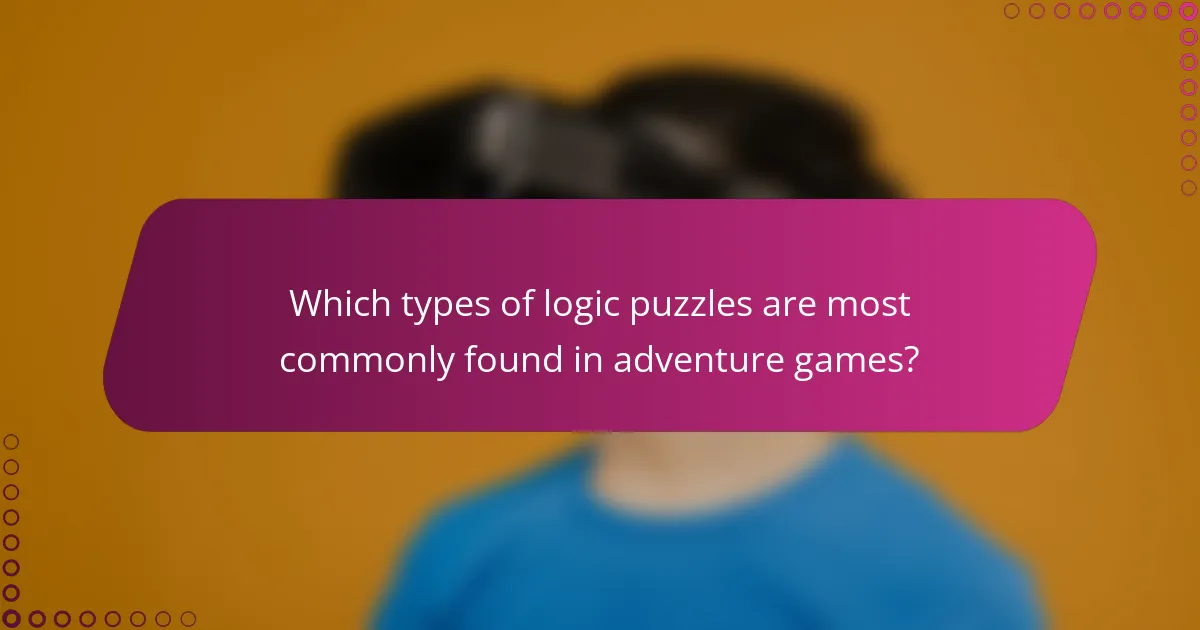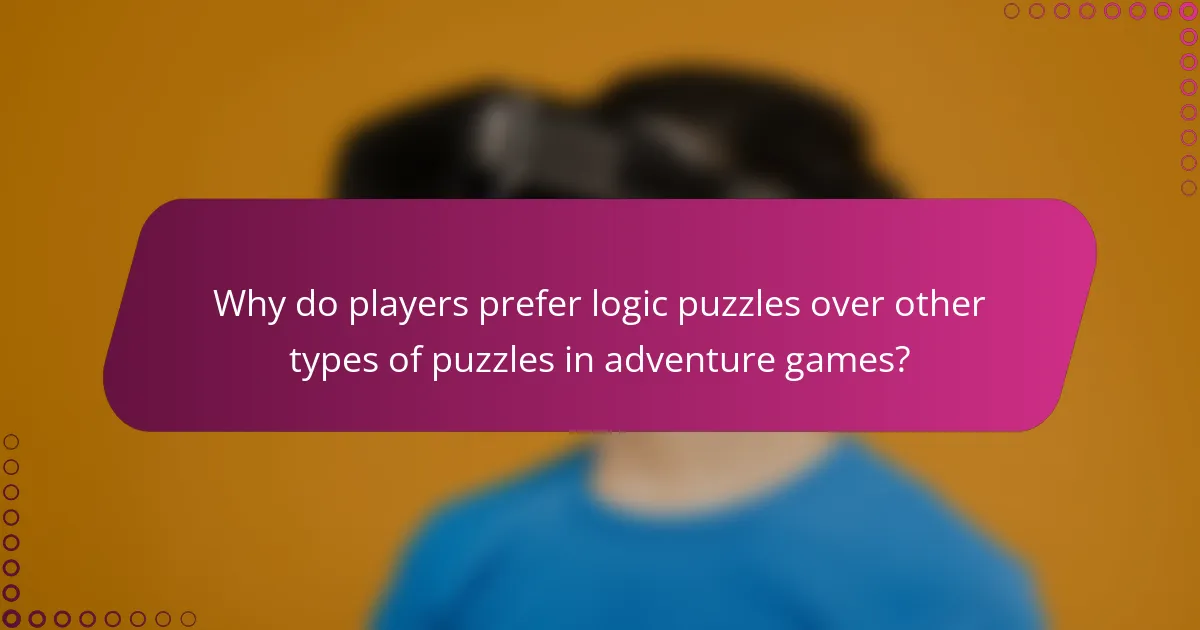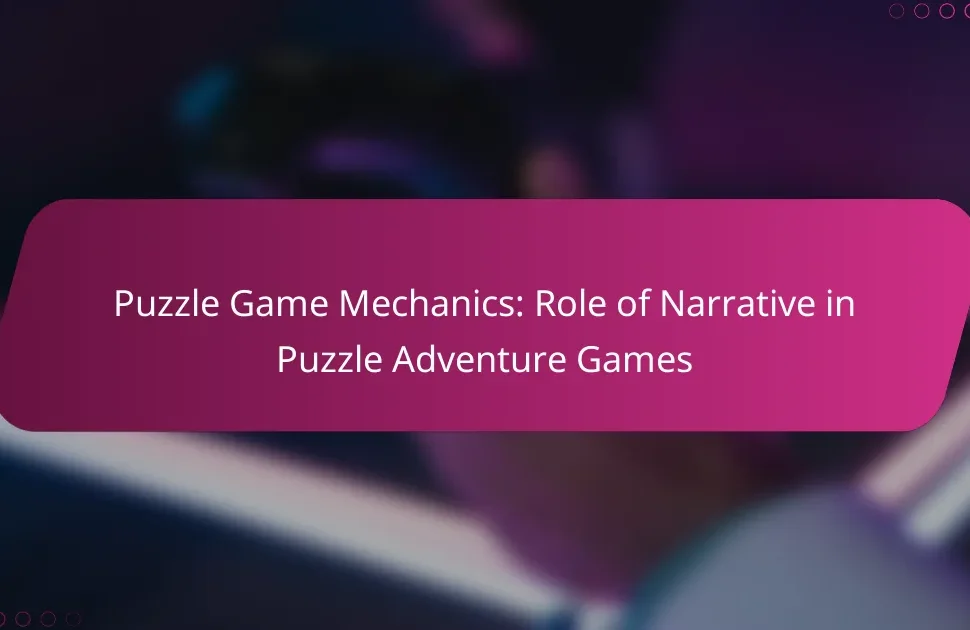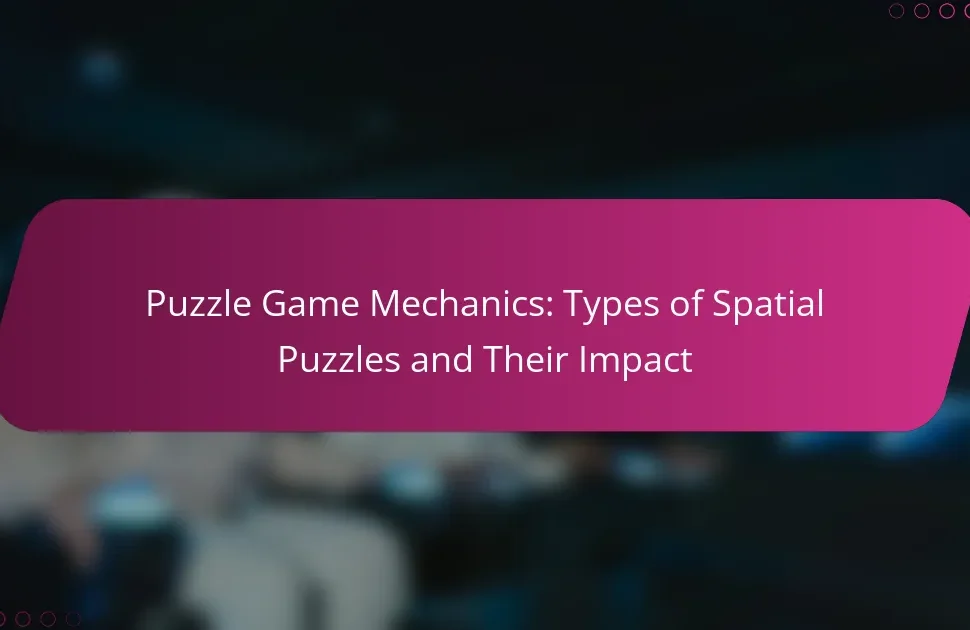Logic puzzles in adventure games enhance player engagement and problem-solving skills. They promote critical thinking, foster creativity, and deepen narrative immersion. Various types of puzzles, such as riddles and deduction challenges, contribute uniquely to gameplay. Additionally, well-designed puzzles can improve game longevity and encourage social interaction among players.

What are the fundamental mechanics of logic puzzles in adventure games?
Logic puzzles in adventure games engage players through critical thinking and problem-solving. These puzzles enhance cognitive skills, improve focus, and provide a sense of accomplishment. Players often experience increased immersion and narrative depth as they unravel challenges. Additionally, logic puzzles can foster creativity by encouraging players to explore multiple solutions.
How do logic puzzles enhance player engagement?
Logic puzzles significantly enhance player engagement by promoting critical thinking and problem-solving skills. They challenge players to analyse situations, encouraging deeper immersion in the game narrative. This engagement leads to increased satisfaction and a sense of accomplishment upon solving puzzles. Additionally, logic puzzles often incorporate unique attributes, such as varying difficulty levels, which cater to different player skill sets, further enhancing the gaming experience. As a result, players are more likely to invest time and effort into the adventure game.
What cognitive skills are developed through solving logic puzzles?
Solving logic puzzles enhances critical thinking, problem-solving, and analytical skills. These cognitive skills improve decision-making and foster creativity in adventure games. Players engage in pattern recognition, which strengthens memory and cognitive flexibility. Additionally, logic puzzles promote perseverance and concentration, essential for overcoming challenges in gameplay.

Which types of logic puzzles are most commonly found in adventure games?
Logic puzzles commonly found in adventure games include riddles, pattern recognition, and deduction challenges. These puzzles enhance gameplay by promoting critical thinking and problem-solving skills. Riddles often require players to interpret clues creatively. Pattern recognition tasks engage players in identifying sequences or anomalies. Deduction challenges necessitate logical reasoning to solve mysteries or progress in the game. Each type of logic puzzle contributes uniquely to the immersive experience of adventure games, making them more engaging and thought-provoking.
How do different puzzle formats impact gameplay experience?
Different puzzle formats significantly enhance gameplay experience by influencing engagement, challenge level, and cognitive stimulation. Logic puzzles in adventure games promote critical thinking and problem-solving skills, leading to deeper immersion.
Various formats, such as word puzzles, jigsaw puzzles, and riddles, cater to different player preferences and abilities. For example, jigsaw puzzles may require spatial reasoning, while word puzzles enhance vocabulary and lateral thinking.
The integration of diverse puzzle formats can also maintain player interest, preventing monotony. Players often appreciate variety, as it encourages exploration and experimentation within the game.
Ultimately, the right mix of puzzle formats can create a balanced gameplay experience, offering both challenge and satisfaction.
What are the challenges in designing effective logic puzzles?
Designing effective logic puzzles presents challenges such as balancing difficulty, ensuring clarity, and maintaining engagement. Developers must create puzzles that are neither too easy nor overly complex, as this can frustrate players. Clear instructions and intuitive mechanics are vital to prevent confusion. Additionally, puzzles must integrate seamlessly into the adventure game’s narrative, enhancing the overall experience without disrupting the flow.

Why do players prefer logic puzzles over other types of puzzles in adventure games?
Players prefer logic puzzles in adventure games due to their engaging complexity and rewarding problem-solving experience. These puzzles enhance critical thinking and provide a sense of accomplishment upon completion. Logic puzzles often require players to analyse patterns and make deductions, fostering deeper immersion in the game narrative. Additionally, they promote strategic planning, as players must often consider multiple steps ahead to solve the puzzles effectively. This combination of mental challenge and narrative integration makes logic puzzles a favoured choice among players.
What role does narrative play in integrating logic puzzles?
Narrative plays a crucial role in integrating logic puzzles by enhancing player engagement and immersion. It provides context, making puzzles feel relevant within the game’s storyline. The narrative framework guides players through challenges, offering clues that align with the plot. This connection fosters a deeper emotional investment in solving the puzzles, enriching the overall gaming experience. Additionally, well-crafted narratives can introduce unique attributes to puzzles, such as thematic elements or character-driven motivations, which can differentiate puzzles from one another and add layers of complexity.
How do player demographics influence puzzle preferences?
Player demographics significantly shape puzzle preferences by influencing the types of logic puzzles they enjoy in adventure games. Younger players often favour fast-paced, visually engaging puzzles, while older players may prefer more traditional, complex challenges that require deep thinking.
Cognitive abilities and problem-solving skills vary across age groups, impacting puzzle complexity preferences. For instance, adults might appreciate intricate storylines intertwined with puzzles, enhancing engagement. Conversely, younger audiences may seek instant gratification from simpler, quicker puzzles.
Cultural background also plays a role in puzzle preferences. Players from different regions may have varying familiarity with certain logic styles, affecting their enjoyment and performance. Additionally, social factors, such as playing in groups versus solo, can influence the type of puzzles players choose, with collaborative puzzles being more appealing in social settings.
Understanding these demographic influences helps game developers create tailored puzzle experiences that resonate with target audiences, enhancing overall player satisfaction and engagement.

How do unique attributes of specific adventure games influence puzzle mechanics?
Unique attributes of specific adventure games significantly enhance puzzle mechanics by tailoring challenges to narrative and gameplay. These attributes create immersive experiences that engage players through context-driven puzzles. For instance, a game set in a historical environment may incorporate logic puzzles based on real events, deepening player investment. Similarly, unique character abilities can introduce specific puzzle-solving methods, making gameplay more dynamic. This integration of unique traits fosters a richer gaming experience, encouraging exploration and critical thinking.
What are some standout examples of games with innovative puzzle designs?
Innovative puzzle designs enhance gameplay by challenging players’ critical thinking and problem-solving skills. Notable examples include “The Witness,” which utilises environmental clues to solve intricate puzzles, and “Portal,” where spatial reasoning is essential for progression. “Braid” introduces time manipulation mechanics, allowing players to rethink their strategies. “Fez” employs a unique 2D/3D perspective shift that alters puzzle dynamics. “The Talos Principle” combines philosophical themes with complex logic puzzles, enriching the narrative experience. These games exemplify how innovative mechanics can transform puzzles into engaging and thought-provoking challenges.
How do cultural themes shape puzzle design in regional adventure games?
Cultural themes significantly influence puzzle design in regional adventure games by integrating local narratives and symbols. These puzzles reflect cultural values, enhancing player immersion. For instance, puzzles based on folklore or historical events resonate with players, providing a deeper connection to the game. Additionally, cultural themes can dictate puzzle complexity and mechanics, aligning with regional gaming preferences. This tailored approach not only enriches gameplay but also fosters a sense of identity and community among players.

What are the benefits of incorporating logic puzzles for game developers?
Incorporating logic puzzles in adventure games enhances player engagement, problem-solving skills, and narrative depth. These puzzles challenge players, fostering critical thinking and creativity.
Additionally, they can improve game longevity by adding replay value. Players often return to games with well-designed puzzles, seeking to overcome challenges again.
Logic puzzles also facilitate social interaction through cooperative play, encouraging teamwork among players. This aspect can lead to a more immersive gaming experience.
Finally, integrating logic puzzles allows developers to showcase unique game mechanics, differentiating their titles in a competitive market.
How can logic puzzles improve game longevity and replayability?
Logic puzzles enhance game longevity and replayability by providing engaging challenges that stimulate critical thinking. They encourage players to explore multiple solutions, fostering creativity and strategic planning. The complexity of logic puzzles can lead to varied gameplay experiences, keeping players invested over time. Additionally, the satisfaction from solving these puzzles can create a rewarding feedback loop, motivating players to return for more challenges.
What are common mistakes developers make when implementing logic puzzles?
Common mistakes developers make when implementing logic puzzles include overcomplicating the rules, failing to provide clear instructions, and neglecting player feedback. These errors can lead to frustration and disengagement. Developers often create puzzles that are too difficult or not intuitive, which detracts from the overall gaming experience. Additionally, not balancing challenge and accessibility can alienate players. Proper testing and iteration are crucial to avoid these pitfalls and enhance player satisfaction.

What best practices should developers follow when creating logic puzzles?
Developers should focus on clarity, engagement, and difficulty balance when creating logic puzzles. Clear instructions enhance player understanding and immersion. Engaging narratives or themes can motivate players to solve puzzles. Balancing difficulty ensures puzzles are challenging yet solvable, maintaining player interest. Incorporating feedback mechanisms helps players learn and adapt their strategies, improving overall gameplay experience.
How can player feedback be utilized to refine puzzle mechanics?
Player feedback can significantly enhance puzzle mechanics by identifying areas for improvement. Analyzing player input helps developers understand challenge levels, engagement, and frustration points. This data can refine puzzle complexity, ensuring they are both challenging and enjoyable. Iterative testing with player feedback leads to balanced mechanics that enhance overall gameplay experience.
What strategies can enhance the accessibility of logic puzzles in games?
Enhancing the accessibility of logic puzzles in games involves implementing clear instructions, adjustable difficulty levels, and visual aids. These strategies ensure players of varying skill levels can engage effectively.
Clear instructions help players understand puzzle mechanics, reducing frustration. Adjustable difficulty allows players to tailor challenges to their abilities, promoting a sense of achievement. Visual aids, such as diagrams or hints, support comprehension and encourage exploration.
Additionally, incorporating diverse puzzle formats can cater to different learning styles. For instance, using auditory cues alongside visual elements can enhance engagement for auditory learners.
Finally, community feedback can guide developers in refining puzzles to ensure they are both challenging and accessible. This iterative process fosters a more inclusive gaming environment.




